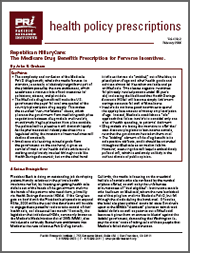Medicare Advantage, in which about one-quarter of Medicare beneficiaries are currently enrolled, is a program that subsidizes beneficiaries’ access to private health insurance. The Pacific Research Institute will shortly publish Medicare Advantage or Medicare Monopoly? a thorough analysis of the costs and benefits of this program for Medicare beneficiaries and taxpayers, which proposes reforms that improve the program. This installment of Health Policy Prescriptions explains why the government’s crude attack on Medicare Advantage plans harms both seniors and taxpayers.
Congress and President Obama object to the cost of Medicare Advantage. At time of writing, two proposals are under active consideration in Congress, H.R. 3962 and the bill approved by the Senate Finance Committee. Both propose reducing payments to Medicare Advantage plans. These steps are expected to save between $124 billion and $172 billion over the next 10 years. They would also have significant consequences for seniors’ access to medical services. In a recent survey of 45 leading managed-care executives, almost all of them concluded that these changes would materially affect beneficiaries’ Medicare Advantage options in the future.
Read Health Policy Prescription


